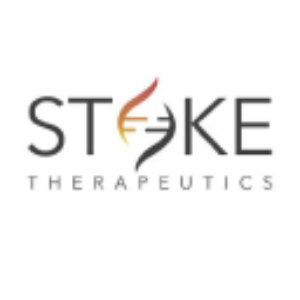Stoke Therapeutics to Present Encore Data at the 15th European Epilepsy Congress that Demonstrate the Potential for Zorevunersen to be the First Disease-Modifying Medicine for the Treatment of Dravet Syndrome
– First presentation of landmark data from Phase 1/2a and OLE studies of zorevunersen that showed substantial reductions in seizures and continued improvements in multiple measures of cognition and behavior –
The Company is advancing zorevunersen (STK-001), a proprietary antisense oligonucleotide (ASO), as the first potential medicine to address the genetic cause of Dravet syndrome. Presentations include a platform session as well as two poster presentations showcasing a comprehensive dataset from the Company’s Dravet syndrome studies.
“Our natural history study makes a compelling case that current treatments are insufficient to address the needs of patients with Dravet syndrome because patients still have high seizure rates and plateau in their neurodevelopment,” said Barry Ticho, M.D., Ph.D., Chief Medical Officer of Stoke Therapeutics. “In this context, and based on the data we have seen from our clinical studies of zorevunersen, we believe we have the potential to change the way this disease is treated by addressing the root cause of the disease, not just the symptoms. We look forward to continuing to work with Dravet syndrome leaders around the world to prepare for a Phase 3 registrational study of zorevunersen.”
Details for the Company’s presentations at EEC are as follows:
-
Title: MONARCH and ADMIRAL: Open-label, Phase 1/2a studies in USA and
UK investigating safety, drug exposure, and clinical effect of zorevunersen, an antisense oligonucleotide (ASO), in children and adolescents with Dravet syndrome
Session: Platform Session – Paediatric Epileptology
Event Type: Platform Session
Presentation Date & Time: Tuesday, September 10, 12:22 – 12:30 PM CEST
Presenter: Helen Cross, MB ChB, Ph.D., Professor, The Prince of Wales’s Chair of Childhood Epilepsy and Head of the Developmental Neuroscience Programme at University College London Great Ormond Street Institute of Child Health, Honorary Consultant in Paediatric Neurology, President of the International League Against Epilepsy
-
Title: 24-month analysis of BUTTERFLY: A prospective, observational study to investigate seizures and comorbidities in children and adolescents with Dravet syndrome (DS)
Event Type: In-Person Posters
Presentation Date & Time: Sunday, September 8, 2:30 PM - 2:33 PM CEST
Presenter: Joseph Sullivan, M.D., FAES, Professor of Neurology and Pediatrics and Director of the Pediatric Epilepsy Center of Excellence at the University of California San Francisco
Poster Number: P788
-
Title: SWALLOWTAIL and LONGWING: Open-Label Extension (OLE) studies for children and adolescents with Dravet syndrome who previously participated in a study of Antisense Oligonucleotide zorevunersen
Event Type: In-Person Posters
Presentation Date & Time: Sunday, September 8 - Tuesday, September 10; Q&A from 1:30 - 3:00 PM CEST each day
Presenter: Andreas Brunklaus, MD, Consultant Paediatric Neurologist at the Royal Hospital for Children,Glasgow , Honorary Professor at the University ofGlasgow , member of Dravet SyndromeUK's Medical Advisory Board
Poster Number: P875
About Dravet Syndrome
Dravet syndrome is a severe and progressive genetic epilepsy characterized by frequent, prolonged and refractory seizures, beginning within the first year of life. Dravet syndrome is difficult to treat and has a poor long-term prognosis. Complications of the disease often contribute to a poor quality of life for patients and their caregivers. The effects of the disease go beyond seizures and often include intellectual disability, developmental delays, movement and balance issues, language and speech disturbances, growth defects, sleep abnormalities, disruptions of the autonomic nervous system and mood disorders. The disease is classified as a developmental and epileptic encephalopathy due to the developmental delays and cognitive impairment associated with the disease. Compared with the general epilepsy population, people living with Dravet syndrome have a higher risk of sudden unexpected death in epilepsy, or SUDEP. There are no approved disease-modifying therapies for people living with Dravet syndrome. One out of 16,000 babies are born with Dravet syndrome, which is not concentrated in a particular geographic area or ethnic group.
About Zorevunersen (STK-001)
Zorevunersen is an investigational new medicine for the treatment of Dravet syndrome currently being evaluated in ongoing clinical trials. Stoke believes that zorevunersen, a proprietary antisense oligonucleotide (ASO), has the potential to be the first disease-modifying therapy to address the genetic cause of Dravet syndrome. Zorevunersen is designed to upregulate NaV1.1 protein expression by leveraging the non-mutant (wild-type) copy of the SCN1A gene to restore physiological NaV1.1 levels, thereby reducing both occurrence of seizures and significant non-seizure comorbidities. Zorevunersen has been granted orphan drug designation by the FDA and the EMA, and rare pediatric disease designation by the FDA as a potential new treatment for Dravet syndrome.
About the
The MONARCH study was a Phase 1/2a open-label study of children and adolescents ages 2 to 18 who have an established diagnosis of Dravet syndrome and have evidence of a genetic mutation in the SCN1A gene. The primary objectives for the study were to assess the safety and tolerability of zorevunersen (STK-001), as well as to determine the pharmacokinetics in plasma and exposure in cerebrospinal fluid. A secondary objective was to assess the efficacy as an adjunctive antiepileptic treatment with respect to the percentage change from baseline in convulsive seizure frequency.
Following completion of MONARCH, patients who met study entry criteria were eligible to continue treatment in SWALLOWTAIL, an open-label extension (OLE) study designed to evaluate the long-term safety and tolerability of repeat doses of zorevunersen. The study is also evaluating the long-term effects of zorevunersen on convulsive seizure frequency and on behavior, cognition and overall quality of life. Dosing in SWALLOWTAIL is ongoing.
About the
The ADMIRAL study was a Phase 1/2a open-label study of children and adolescents ages 2 to <18 who have an established diagnosis of Dravet syndrome and have evidence of a genetic mutation in the SCN1A gene. The primary objectives for the study were to assess the safety and tolerability of multiple doses of zorevunersen (STK-001), as well as to determine the pharmacokinetics in plasma and exposure in cerebrospinal fluid. A secondary objective was to assess the effect of multiple doses of zorevunersen as an adjunctive antiepileptic treatment with respect to the percentage change from baseline in convulsive seizure frequency. Overall clinical status and quality of life were secondary endpoints of ADMIRAL.
Following completion of ADMIRAL, patients who met study entry criteria were eligible to continue treatment in LONGWING, an open-label extension (OLE) study designed to evaluate the long-term safety and tolerability of repeat doses of zorevunersen. The study is also evaluating the long-term effects of zorevunersen on convulsive seizure frequency and on behavior, cognition and overall quality of life. Dosing in LONGWING is ongoing.
About the BUTTERFLY Observational Study
The BUTTERFLY study was a multicenter, longitudinal, prospective, observational study of children and adolescents ages 2 to 18 who have been diagnosed with Dravet syndrome as a result of an SCN1A gene mutation. This study was designed to evaluate neurodevelopmental status and change from baseline to 24 months. Secondary and exploratory endpoints in the study evaluated changes in other disease measures, including seizures and additional non-seizure comorbidities. No investigational medications or other treatments were provided. Participants continued to receive their usual care, including anti-seizure medications, and were observed for up to two years. The study was conducted at approximately 20 sites in
About Stoke Therapeutics
Stoke Therapeutics (Nasdaq: STOK), is a biotechnology company dedicated to restoring protein expression by harnessing the body’s potential with RNA medicine. Using Stoke’s proprietary TANGO (Targeted Augmentation of Nuclear Gene Output) approach, Stoke is developing antisense oligonucleotides (ASOs) to selectively restore protein levels. Stoke’s first compound, zorevunersen (STK-001), is in clinical testing for the treatment of Dravet syndrome, a severe and progressive genetic epilepsy. Dravet syndrome is one of many diseases caused by a haploinsufficiency, in which a loss of ~
Cautionary Note Regarding Forward-Looking Statements
This press release contains forward-looking statements within the meaning of the “safe harbor” provisions of the Private Securities Litigation Reform Act of 1995, including, but not limited to: the ability of zorevunersen to treat the underlying causes of Dravet syndrome and reduce seizures or show improvements in non-seizure comorbidities, the timing and expected progress of clinical trials, regulatory meetings and regulatory decisions, and the participation of scientists associated with the Company making presentations at EEC and the presentation of data at EEC. Statements including words such as “expect,” “plan,” “will,” “continue,” or “ongoing” and statements in the future tense are forward-looking statements. These forward-looking statements involve risks and uncertainties, as well as assumptions, which, if they prove incorrect or do not fully materialize, could cause our results to differ materially from those expressed or implied by such forward-looking statements, including, but not limited to, risks and uncertainties related to: the Company’s ability to advance, obtain regulatory approval of, and ultimately commercialize its product candidates, including zorevunersen; the timing of data readouts and interim and final results of preclinical and clinical trials; the receipt and timing of potential regulatory decisions; positive results in a clinical trial may not be replicated in subsequent trials or successes in early stage clinical trials may not be predictive of results in later stage trials; the Company’s ability to fund development activities and achieve development goals; the Company’s ability to protect its intellectual property; the direct or indirect impact of global business, political and macroeconomic conditions, including inflation, interest rate volatility, cybersecurity events, uncertainty with respect to the federal budget, instability in the global banking system and volatile market conditions, and global events, including public health crises, and ongoing geopolitical conflicts, such as the conflicts in
View source version on businesswire.com: https://www.businesswire.com/news/home/20240903430091/en/
Stoke Media & Investor Contacts:
Dawn Kalmar
Chief Communications Officer
dkalmar@stoketherapeutics.com
781-303-8302
Doug Snow
Director, Communications & Investor Relations
IR@stoketherapeutics.com
508-642-6485
Source: Stoke Therapeutics, Inc.








